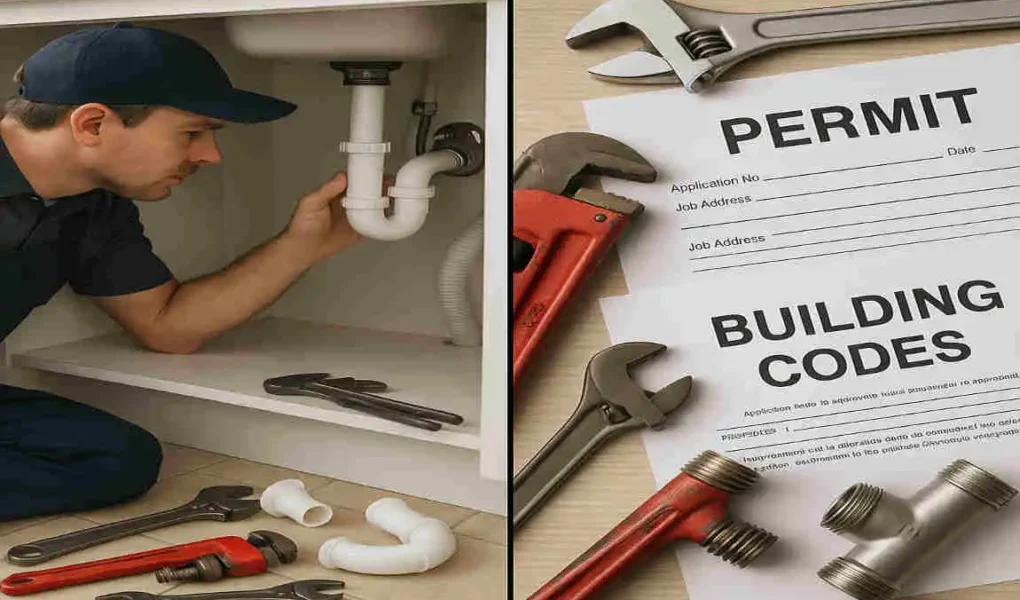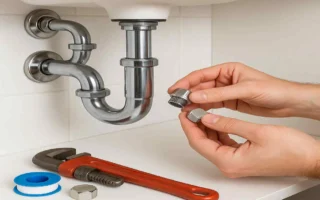Imagine this: You’re staring at a leaky faucet in your kitchen, and suddenly you’re thinking about upgrading the whole sink. Or your old water heater is on its last legs, and you’re tempted to swap it out yourself over the weekend. These are the kinds of home plumbing projects that pop up for many homeowners. But before you grab your tools, have you ever stopped to ask yourself, Do I need a permit for home plumbing work? It’s a question that could save you a world of trouble.
Permits aren’t just bureaucratic red tape—they’re there to keep your home safe and up to code. Think about it: plumbing involves water, pipes, and sometimes even gas lines. One wrong move, and you could flood your basement or create a health hazard. That’s why understanding the rules is crucial.
We’ll start by explaining what a plumbing permit really means and why it matters. Then, we’ll cover when you actually need one for your projects, and what happens if you skip it. You’ll learn the step-by-step process for applying, along with key codes and regulations that influence these rules. We’ll also compare DIY approaches to hiring pros, share practical tips, and answer common questions. By the end, you’ll feel confident tackling your next plumbing task the right way.
Why does all this matter? Legal compliance isn’t just about avoiding fines—it’s about protecting your family, your property, and even your wallet in the long run. Safety comes first, and permits ensure that professionals check your work to prevent disasters. Plus, if you’re selling your home someday, having everything documented can make the process smoother.
What Is a Plumbing Permit?
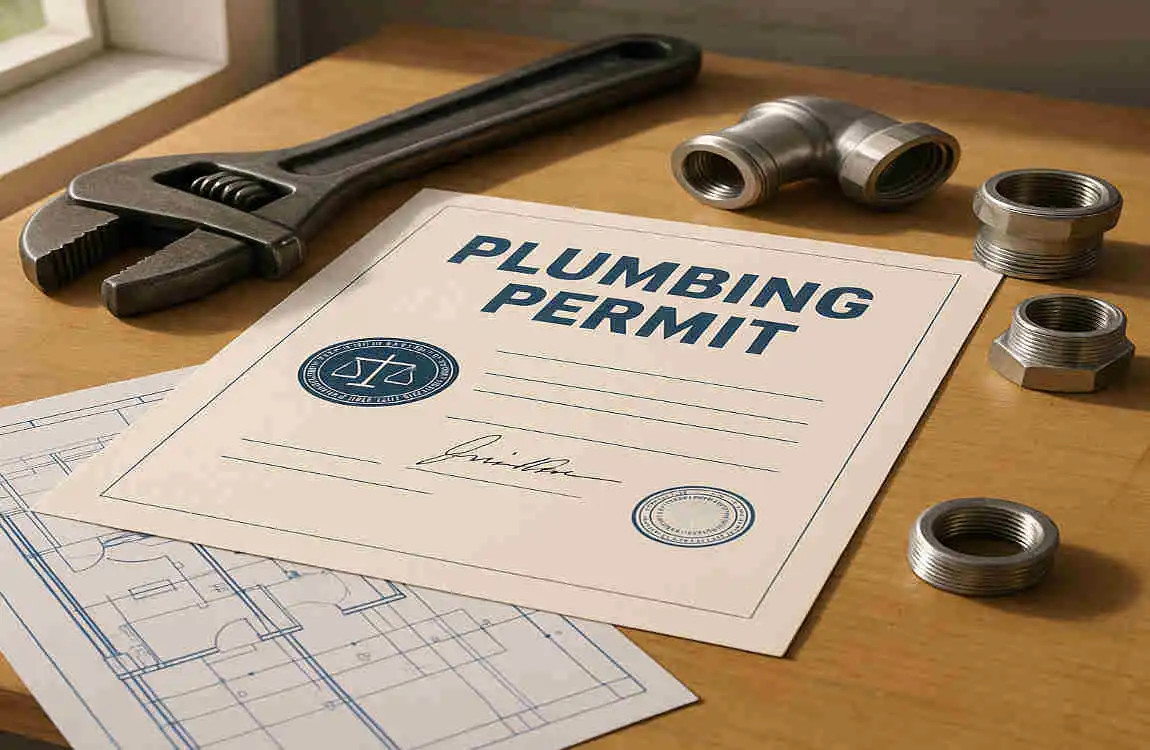
Let’s break it down: A plumbing permit is basically official permission from your local government to do certain types of plumbing work on your home. It’s like a green light that says, “Go ahead, but make sure it’s done right.” Without it, you might be breaking the law, even if your intentions are good.
At its core, this permit ensures that any changes to your home’s plumbing system meet safety standards. Imagine installing a new shower without one—what if the pipes aren’t connected properly? Water damage or even mold could follow. Permits prevent these issues by requiring inspections.
Now, why do these permits exist? Their primary purpose is to protect you, your family, and the community. They make sure plumbing work complies with building codes, which are rules designed to prevent accidents. For example, codes might specify how pipes should be sized to safely handle water pressure. This isn’t just about convenience; it’s about preventing floods, leaks, or worse, like contaminated water supplies.
Permits also play a significant role in broader construction projects. If you’re remodeling your bathroom, the plumbing permit is tied to the overall building permit. It guarantees quality work that lasts, so you don’t have to redo everything later.
Who issues these permits? Usually, it’s your local building department or municipal council. In the U.S., this could be a city or county office. They review your plans and inspect the work to confirm it’s safe. Sometimes state agencies get involved in larger projects, but it starts locally.
Think about your own home for a second. Have you ever wondered if that old pipe in the basement is up to code? Permits help ensure it is by bringing in experts to check. This system builds trust—homeowners know their work is vetted, and cities know homes are safe.
In short, plumbing permits aren’t optional for big jobs. They enforce laws that protect everyone. If you’re asking, “Do I need a permit for home plumbing work?” starting with this understanding is key. It sets the foundation for safer, more innovative home improvements.
Local departments handle most permits, but some areas have specialized plumbing boards. Check online or call to find yours.
When Do You Need a Permit for Home Plumbing Work?
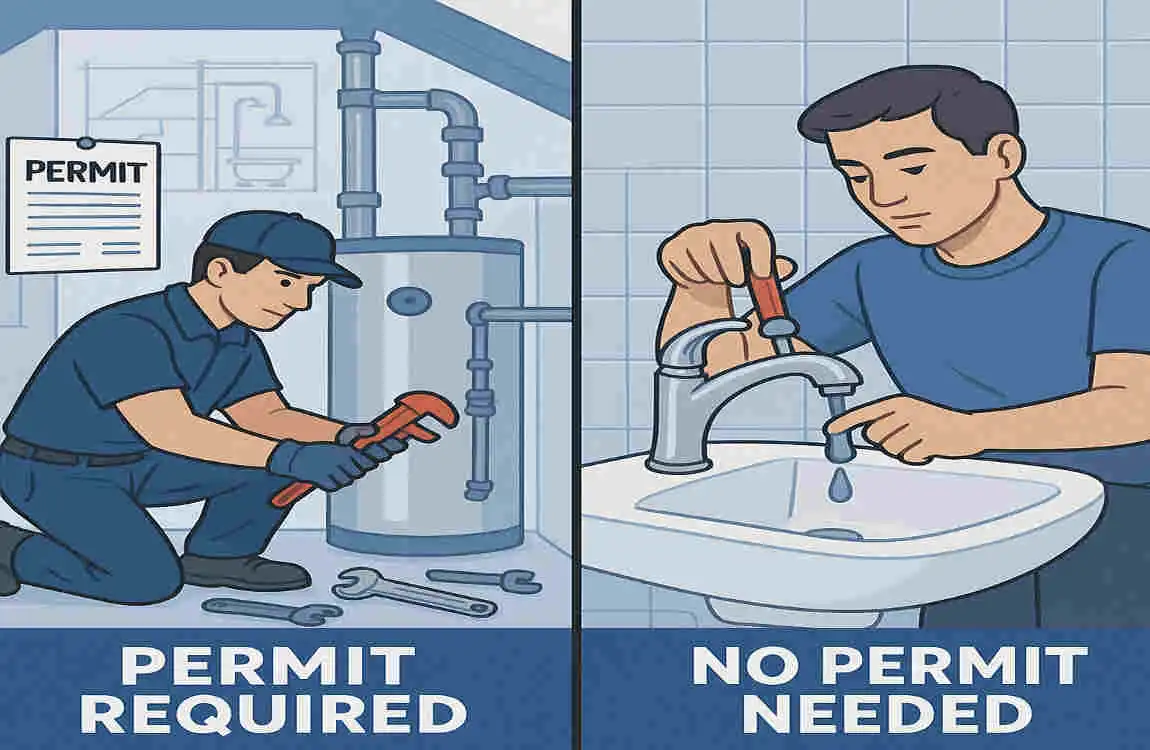
This is where things get practical. Not every plumbing system task requires a permit, but many do—especially if they’re major. Let’s explore this so you can determine whether determine whether I need a license for home plumbing work on your specific project.
First off, consider the scale. If you’re dealing with anything that significantly alters your home’s plumbing system, you’ll likely need approval. This includes installing new pipes or replacing old ones. For instance, adding a bathroom to your basement means rerouting water lines, which definitely calls for a permit.
Water heater swaps are another common one. Replacing an old unit with a new one? Most places require a permit because they involve gas or electrical connections, which can be dangerous if mishandled.
Sewer line issues? Repairing or replacing them often requires official approval because they connect to public systems. Major remodels, like kitchen overhauls with new sinks and disposals, fall into this category too.
But hey, not everything needs paperwork. Minor fixes, like unclogging a drain or swapping a faucet without touching pipes, usually don’t. Replacing a toilet if you’re not changing the plumbing layout? Often permit-free.
Location matters a lot. Rules vary by city, state, or even neighborhood. In California, for example, seismic codes might add requirements, while rural areas could be more lenient. Always check your local codes—don’t assume.
Reader, picture this: You’re excited about a DIY project, but skipping the permit check could bring everything to a halt. I recommend contacting your building department early. It’s a quick call that saves headaches.
To sum up, if your project changes the system’s structure or involves safety risks, get that permit. It ensures your work is inspected and approved, keeping your home safe.
Projects That Typically Require Permits
Here are some common ones in a bulleted list for easy reference:
- Installing or replacing water supply pipes affects the entire system.
- Water heater installation or upgrades: Due to energy and safety concerns.
- Sewer line repairs or full replacements: Impacts public health.
- Adding new fixtures in remodels, like sinks, in a new island kitchen.
Consequences of Performing Plumbing Work Without a Permit
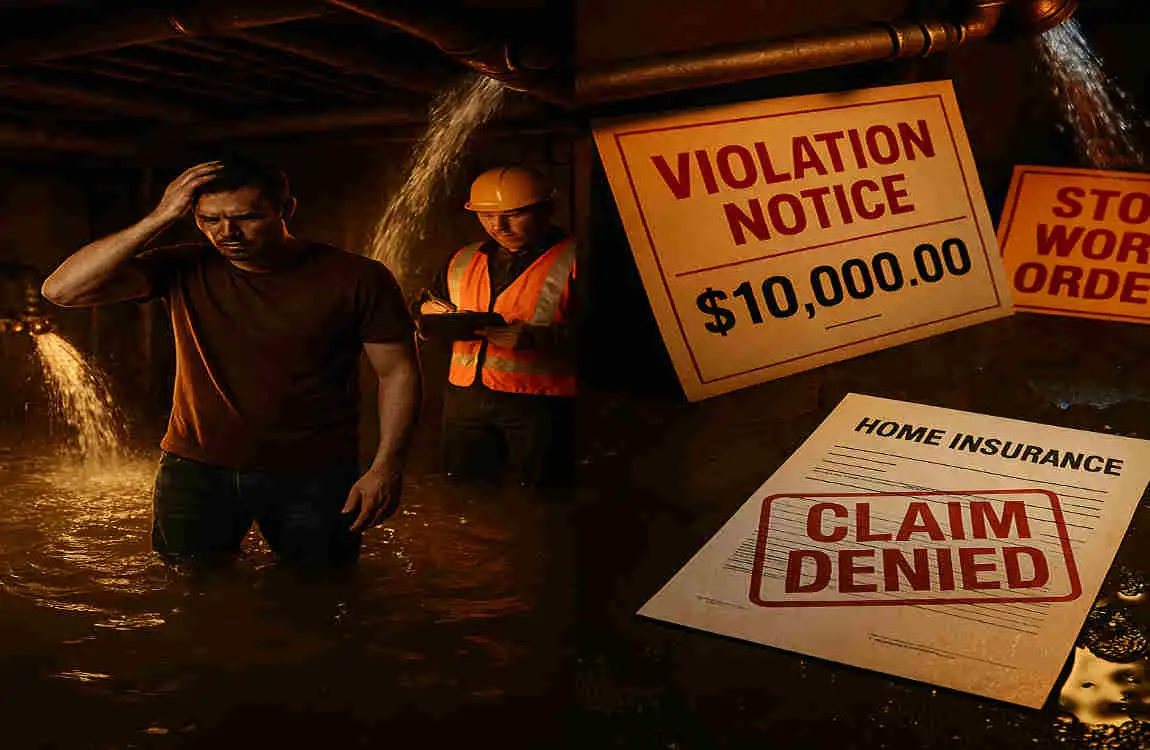
Skipping a permit might seem like a shortcut, but it can backfire big time. Let’s talk about the real risks so you understand why asking “Do I need a permit for home plumbing work?” is non-negotiable.
Legally, you could face fines—sometimes hundreds or thousands of dollars. Inspectors might issue a stop-work order, forcing you to halt mid-project and fix issues.
Financially, it’s a hit too. If something goes wrong, your home insurance might not cover damages from unpermitted work. Imagine a burst pipe flooding your home—claim denied because no permit was obtained.
Selling your house? Unpermitted work must be disclosed, which could scare off buyers or lower your sale price. You may need to retroactively obtain approvals, which will cost more.
Safety is the scariest part. Without inspections, faulty plumbing could lead to leaks, mold, or electrical hazards. Think about your family—do you want to risk that?
Reader, I’ve seen homeowners regret this. One small oversight turns into a nightmare. Always prioritize permits to avoid these pitfalls.
How to Apply for a Plumbing Permit
Ready to get that permit? It’s not as daunting as it sounds. I’ll walk you through the steps so you can handle home plumbing work like a pro.
Start by confirming you need one—review your project against local rules.
Next, contact your building department. Many have online portals for applications.
Gather documents: Submit plans, contractor details if applicable, and site info.
Pay fees—they range from $50 to $500—and wait for processing, which takes days to weeks.
Tips: Be detailed in your application to speed things up. Hire a licensed plumber if you’re unsure—they often handle this.
Here’s a simple table to outline the process:
Step Description Tips
1. Identify Need: Check if your project requires a permit. Use online code checkers.
2. Contact Authority Call or visit the local department. Go digital for faster submission.
3. Submit Docs: Provide plans and info. Include drawings for clarity.
4. Pay and Wait Cover fees; processing varies. Budget extra time.
5. Schedule Inspections. Get approvals at key stages. Don’t cover work before checks.
Reader, follow this, and you’ll sail through. It’s empowering to do it right!
Understanding Plumbing Codes and Regulations
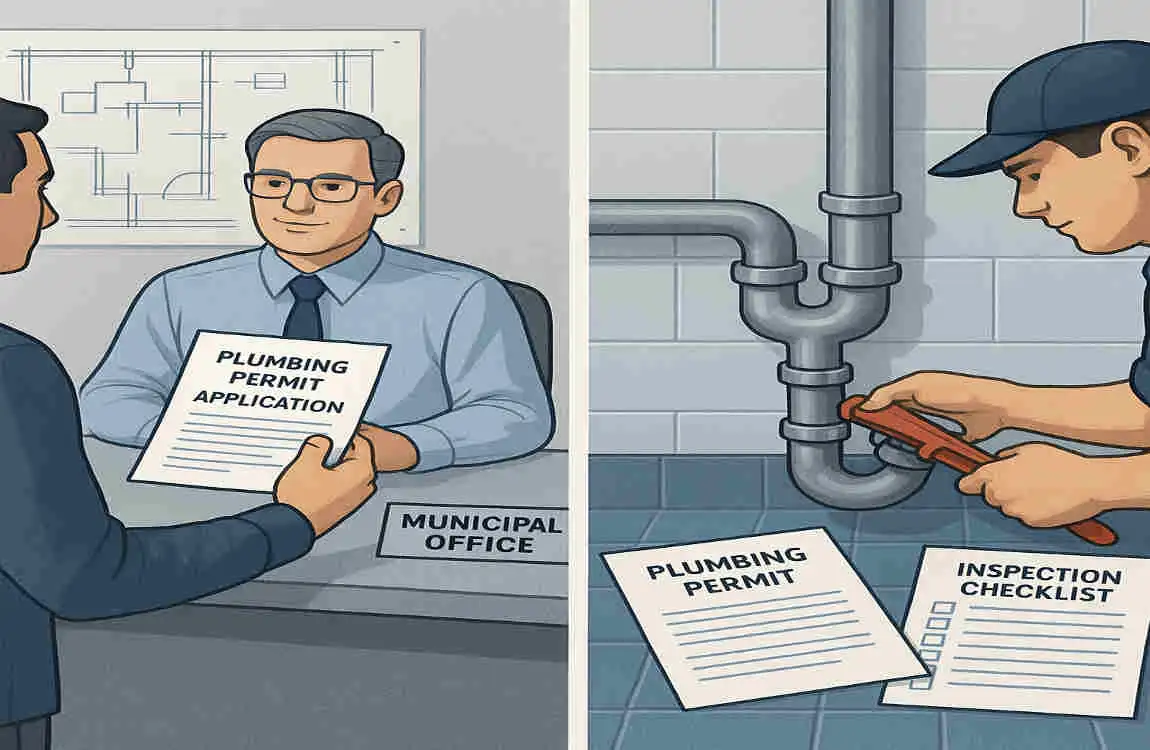
Codes are the rulebook for plumbing. The International Plumbing Code (IPC) and Uniform Plumbing Code (UPC) are big ones, with local tweaks.
They dictate permit requirements, such as pipe materials or fixture placements.
Compliance means safer homes—inspections ensure it.
Resources? Check online code libraries or ask locals.
Reader, learning these empowers you.
Frequently Asked Questions (FAQ) Section
Got questions? Here are answers to common questions about whether I need a permit for home plumbing work.
Do I need a permit to fix a leak? Usually, no, for simple fixes. But if it involves pipe replacement, check locally.
Can I apply for a permit myself, or does my plumber do it? You can, but plumbers often handle it for efficiency.
How long does it take to get a plumbing permit? Days to weeks, depending on your area.
What if my permit application is denied? Revise and resubmit—common issues are incomplete plans.
Are permits transferable if I sell my home during the project? Typically, no; new owners may need to reapply.

